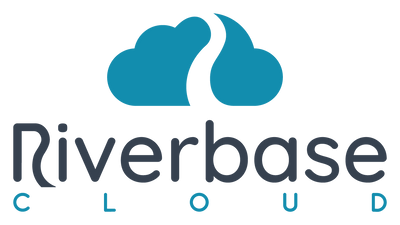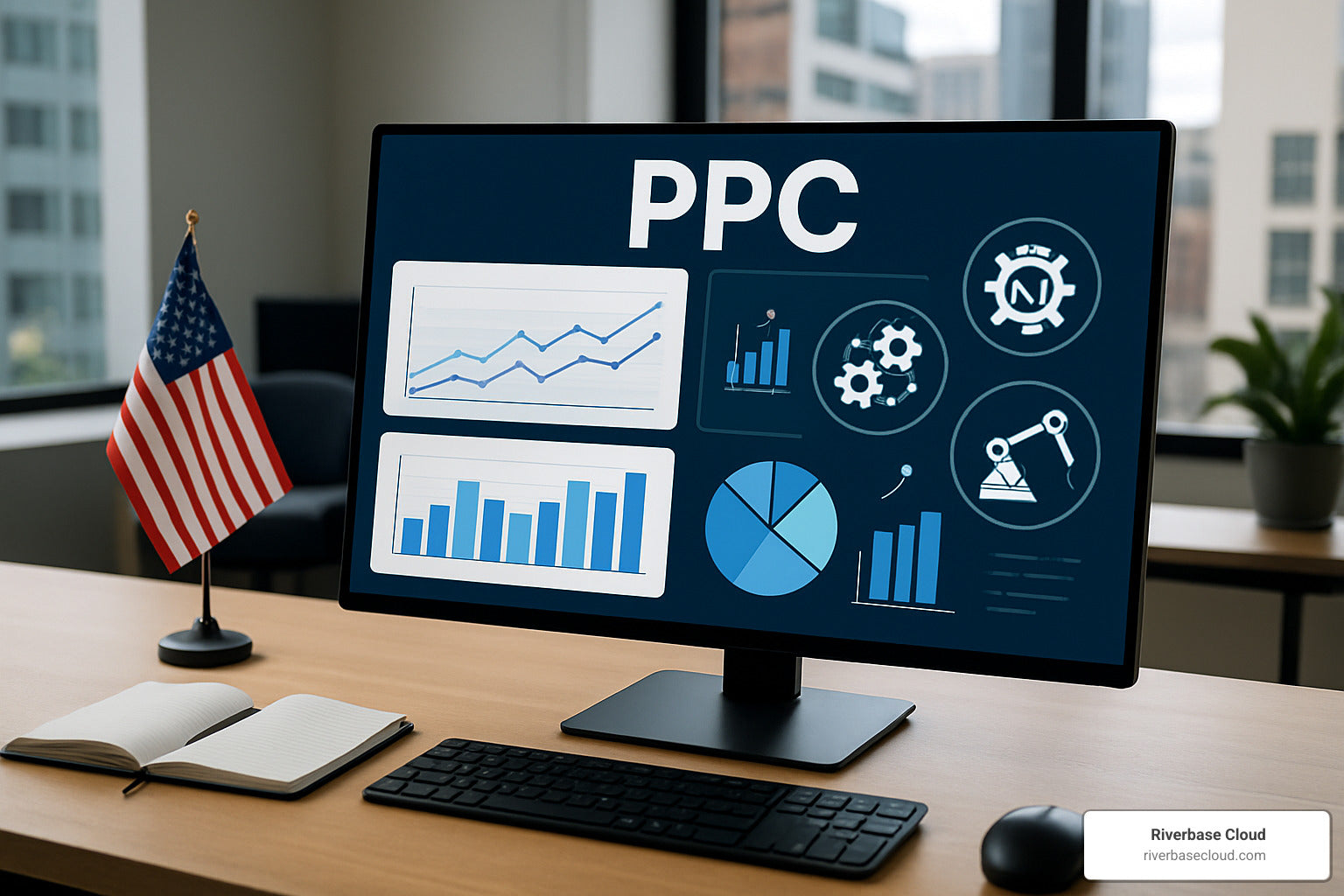Changing PPC Campaigns with AI
AI tools for PPC are revolutionizing how businesses manage their pay-per-click advertising. Here are the top tools that can immediately improve your campaigns:
- Optmyzr - Real-time bid optimization and campaign management
- Google's Performance Max - Cross-channel AI campaign automation
- Semrush AI Ad Copy Generator - Data-driven ad creative generation
- Jasper - AI copywriting for headlines and descriptions
- Pencil - Automated visual and copy creation for ads
- Revealbot - Automated rules and audience optimization
In the world of digital marketing, managing effective PPC campaigns has become increasingly complex and time-consuming. AI tools for PPC offer a solution by automating routine tasks, providing data-driven insights, and optimizing campaign performance in real-time. These tools can handle everything from bid management and keyword research to ad copywriting and performance analytics, freeing up marketers to focus on strategy and creative direction.
The landscape of PPC advertising has fundamentally changed. What once required hours of manual analysis and adjustments can now be accomplished in minutes through machine learning algorithms that continuously learn and improve. For businesses with limited marketing resources, these AI-powered solutions level the playing field, allowing them to compete effectively against larger competitors with bigger budgets.
My name is Gary Gilkison, and as the founder of Riverbase Cloud, I've helped hundreds of businesses transform their PPC performance using AI tools for PPC that balance powerful automation with strategic human oversight.
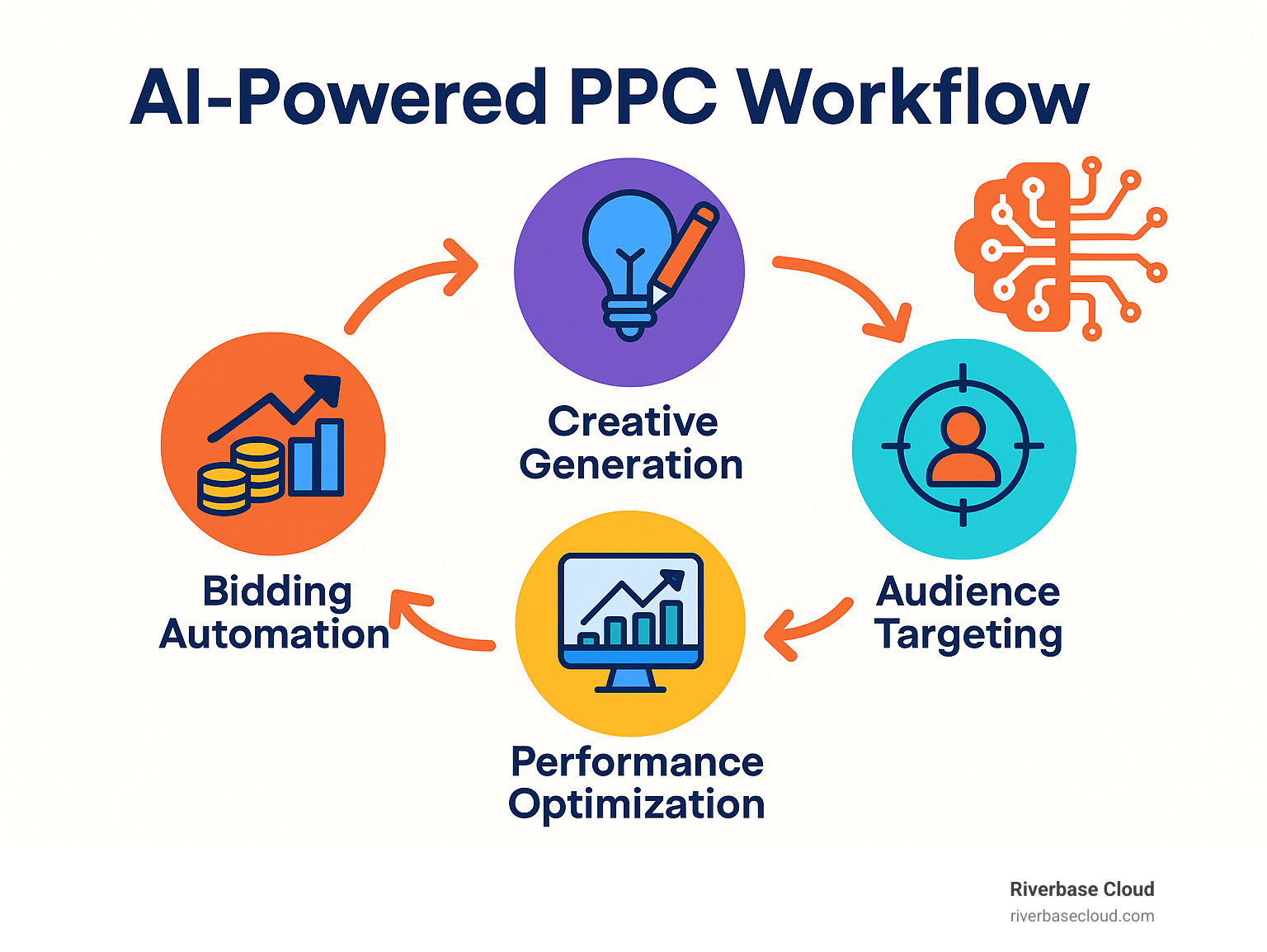
AI tools for PPC glossary:
- AI-driven SEO tools
- AI marketing automation
- Transparent marketing solutions
What You'll Learn
In this comprehensive guide, we'll explore how AI tools for PPC can transform your advertising efforts. You'll find:
- The core mechanisms behind AI-powered PPC tools and why they matter
- Key benefits across multiple campaign aspects, from audience targeting to reporting
- Detailed reviews of the best AI PPC tools available in 2024
- How to select the right AI tools for your specific business needs
- Best practices for balancing AI automation with human oversight
- Expert tips for implementing AI tools effectively in your PPC strategy
Whether you're new to PPC advertising or looking to improve your existing campaigns, this guide will help you steer the AI landscape to achieve better results with less effort.
AI tools for PPC: How They Work & Why They Matter
Ever wondered what actually happens behind the scenes when you use AI tools for PPC? Let me break it down for you in plain English – no computer science degree required!
Think of these tools as your tireless digital marketing assistants that never need coffee breaks. Unlike the old-school automation tools that simply followed rigid rules, today's AI assistants are constantly learning and adapting based on what's actually working in your campaigns.
AI tools for PPC are powered by some pretty impressive technology that's working hard for you:
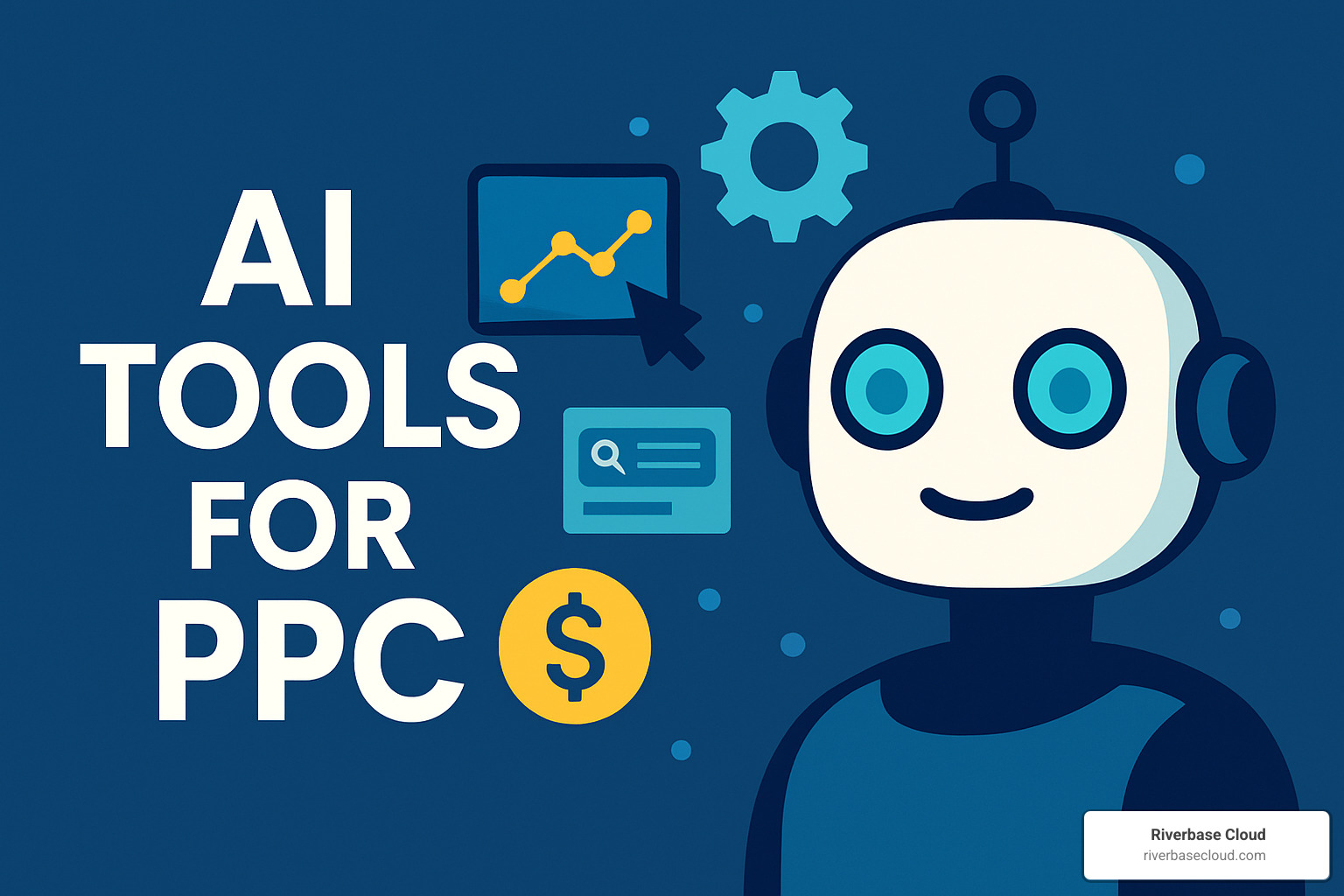
What makes these tools so valuable is their ability to process mountains of data in seconds – something that would take even the most caffeinated marketer days or weeks to analyze. They're constantly scanning for patterns, testing different approaches, and making tiny adjustments that add up to significant improvements.
The real magic happens with real-time optimization. For example, Google's Smart Bidding evaluates each auction opportunity (and there are thousands every day) to predict how likely someone is to convert. Then it adjusts your bid accordingly – all in milliseconds. This happens 24/7, even while you're sleeping!
According to research from The Conference Board, a whopping 82% of marketing professionals believe AI will significantly boost their team's productivity. And they're right! These tools handle the time-consuming grunt work so you can focus on the creative and strategic decisions that humans do best.
The predictive analytics capabilities of AI tools for PPC are particularly game-changing. Instead of just looking at what happened yesterday, these tools are forecasting what's likely to happen tomorrow, helping you stay ahead of trends rather than just reacting to them.
What's especially exciting is how accessible this technology has become. Not long ago, this kind of sophisticated AI was only available to enterprise companies with massive budgets. Today, businesses of all sizes can leverage these powerful tools to compete effectively – even against much larger competitors.
The bottom line? AI tools for PPC aren't just making campaigns more efficient – they're fundamentally changing what's possible in digital advertising by handling complexity at a scale and speed that humans simply can't match on their own.
Key Benefits & Use-Case Categories
AI tools for PPC aren't just fancy tech – they're game-changers for marketers who want better results without the headaches. A recent survey of over 1,000 marketing professionals revealed that most are using AI for performance analytics, audience targeting, campaign creation, and personalization – and seeing impressive returns.
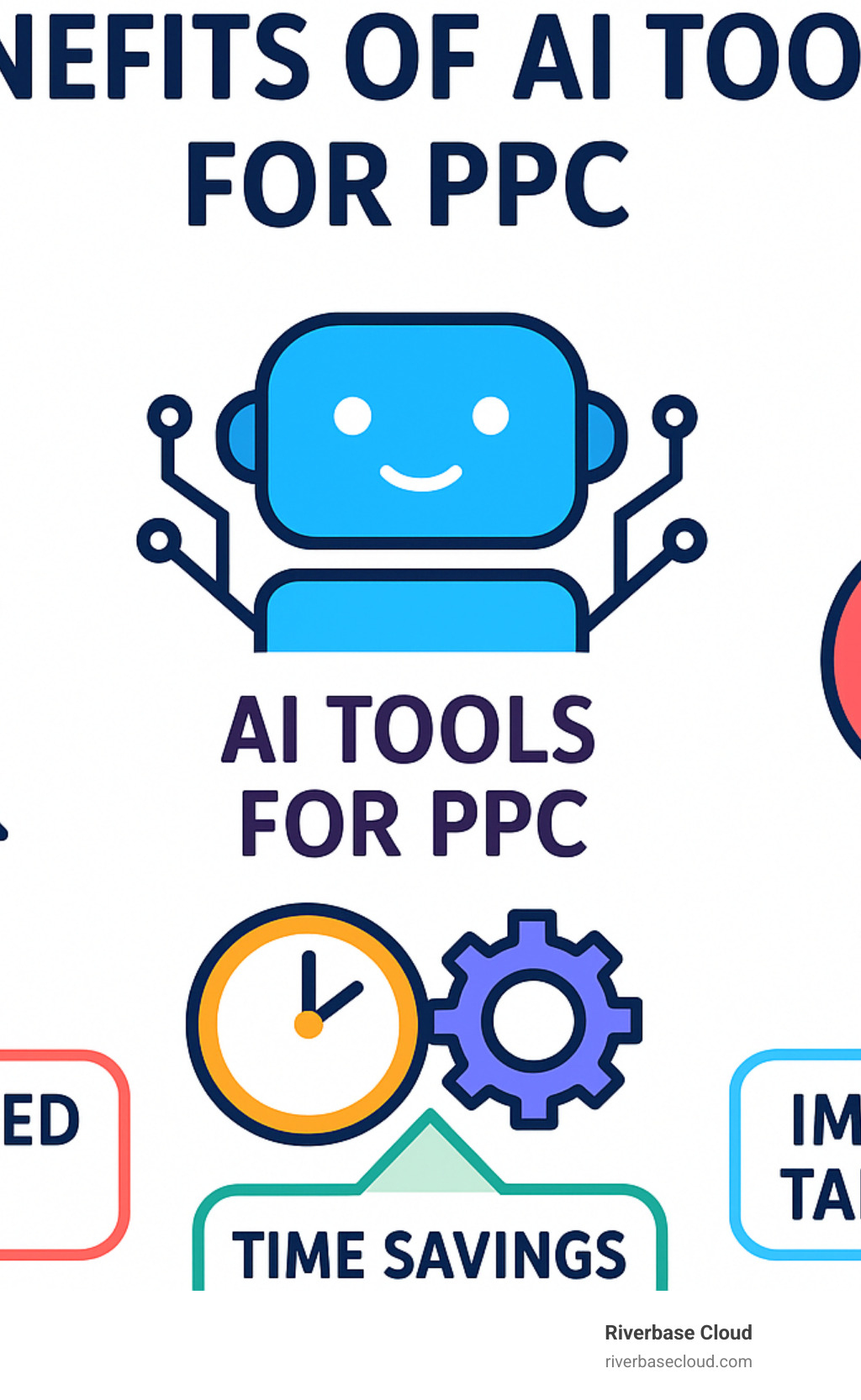
Improved Audience Targeting
Finding your perfect customer used to feel like searching for a needle in a haystack. Now, AI tools for PPC make it surprisingly simple.
Facebook's Advantage+ Audience, for example, uses sophisticated algorithms to find users who behave just like your best customers – even if they don't match traditional demographic profiles. These look-alike audiences often outperform manually created segments because they're based on actual behavior patterns rather than assumptions.
Tools like Revealbot take targeting even further by continuously analyzing performance data and automatically adjusting your audience segments. This means your budget naturally flows toward the people most likely to convert, without you having to manually reallocate funds every few days.
I've found that one of the most practical applications is using ChatGPT to analyze your existing customer data and generate detailed audience personas. These AI-created profiles can reveal surprising insights about your customers that might never have occurred to you.
Smarter Bidding & Budget Allocation
Let's be honest – manual bid management is both tedious and ineffective compared to what AI can do. AI tools for PPC shine brightest when it comes to optimizing your ad spend.
Google Smart Bidding has transformed how we approach PPC by analyzing countless signals in real-time for every auction. It can adjust your bids based on device, location, time of day, remarketing lists, and dozens of other factors simultaneously – something no human could possibly manage.
At Riverbase Cloud, we've seen clients achieve 20-30% improvements in ROAS after implementing AI bidding strategies. The difference is particularly noticeable for businesses with seasonal fluctuations or complex customer journeys.
Optmyzr takes things a step further by not just optimizing current bids but predicting future performance based on historical patterns. This predictive capability helps ensure your budget is paced appropriately throughout the day and week, rather than being depleted during less efficient times.
Dynamic Creative & Copywriting
Writing compelling ad copy that converts is an art – but now it's an art with some serious AI assistance. AI tools for PPC can generate creative variations that would take hours to write manually.
Semrush AI Ad Copy Generator and Jasper have become invaluable for creating multiple headlines and descriptions that incorporate your keywords naturally while staying within character limits. What used to take hours now happens in minutes, allowing you to test more variations and find winners faster.
For visual ads, platforms like Pencil are nothing short of revolutionary. They've helped thousands of brands generate over a million AI ad creatives that consistently outperform manually created ones. The platform can combine your brand elements with AI-generated visuals and copy to create ads that feel custom-made but require fraction of the effort.
Streamlined Keyword Research
Keyword research used to be a mind-numbing exercise in spreadsheet management. Now, AI tools for PPC transform it into an insightful exploration of customer intent.
Tools like PromoNavi can identify valuable long-tail keywords that traditional research might miss. These longer, more specific phrases often have lower competition but higher conversion rates – the perfect recipe for PPC success.
What I find particularly valuable is how AI analyzes intent behind keywords. By understanding whether someone is researching, comparing, or ready to buy, you can tailor your bidding strategy appropriately. This intent-based approach typically yields higher conversion rates and lower cost-per-acquisition.
Using ChatGPT with carefully crafted prompts has become another powerful technique for keyword findy. When you feed it information about your products and target audience, it can generate keyword ideas from perspectives you might not have considered.
Landing Page Optimization
Even the best-targeted ads fall flat if they lead to poor landing pages. AI tools for PPC now extend their magic to this crucial conversion point.
Platforms like Unbounce and Instapage use sophisticated AI to test multiple page elements simultaneously, identifying winning combinations much faster than traditional A/B testing. This multivariate approach means you can optimize headlines, images, button colors, and form layouts all at once.
The personalization capabilities are particularly impressive. Modern AI tools can dynamically adjust landing page content based on the visitor's demographics, behavior, or the specific keywords they searched. This relevance dramatically improves conversion rates – we've seen increases of 15-25% for our clients at Riverbase Cloud.
Automated Reporting & Insights
Data without insights is just numbers. AI tools for PPC transform campaign metrics into actionable intelligence that drives better decisions.
Tools like Swydo and Reporting Ninja automatically generate comprehensive reports custom to your specific KPIs. But they go beyond just presenting data – they highlight anomalies, identify trends, and suggest optimization opportunities you might otherwise miss.
The time savings here are substantial. What might take hours of manual analysis can be accomplished in minutes, freeing you to focus on strategy rather than spreadsheets. Plus, AI can spot subtle patterns across campaigns that might indicate broader market shifts or opportunities.
For more information about building a comprehensive AI marketing strategy that incorporates these benefits, check out our guide on The AI Advantage: Building a Winning Marketing Strategy.
Best AI-Powered PPC Tools of 2024
Navigating the sea of AI tools for PPC can feel overwhelming - trust me, I've been there! After testing dozens of platforms with our clients at Riverbase Cloud, I've put together this handpicked collection of tools that truly deliver results in 2024. These aren't just flashy new technologies; they're battle-tested solutions that can transform your PPC performance.
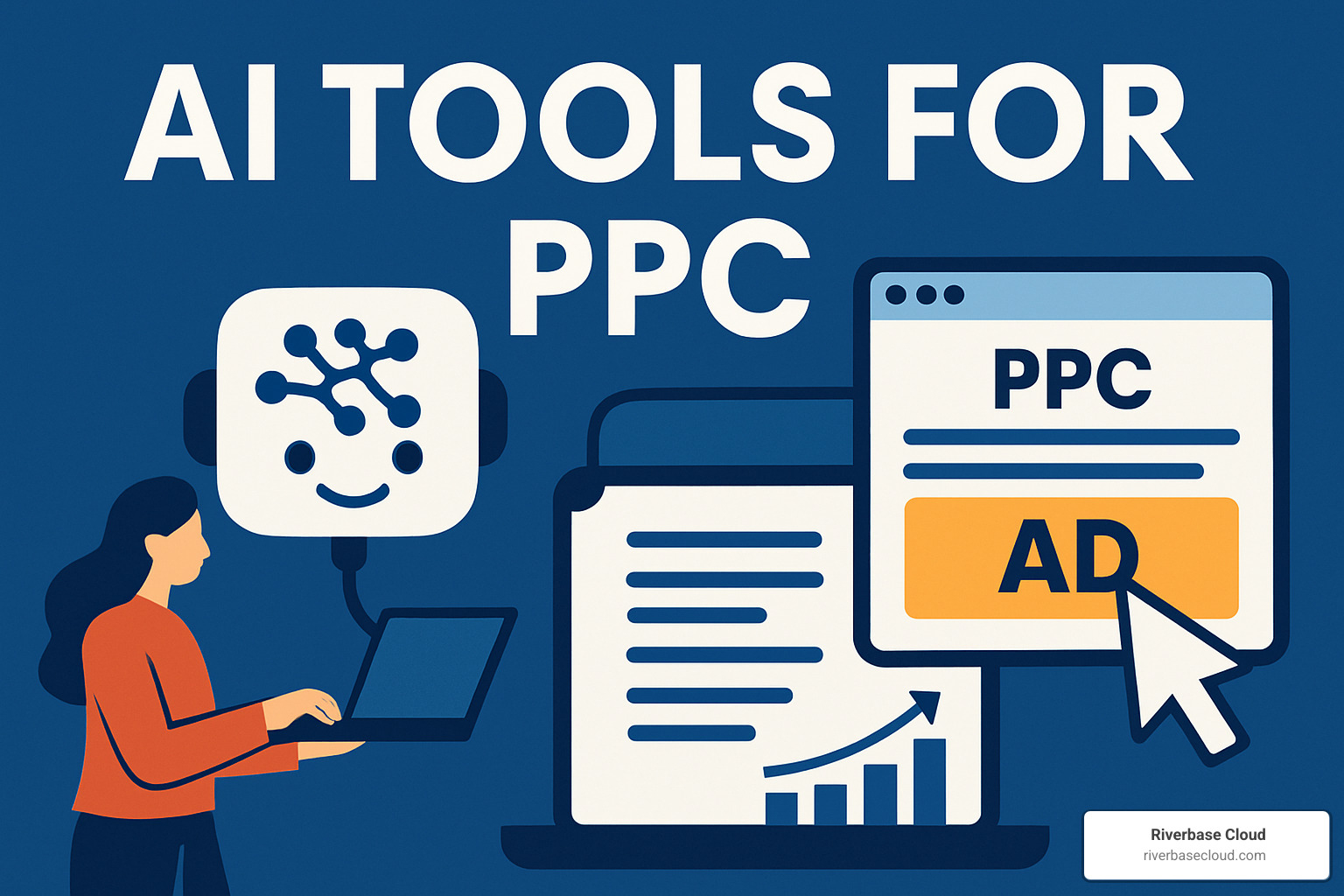
Bidding & Budget Tools
The foundation of any successful PPC campaign starts with smart bidding and budget allocation. Here's what's working best in 2024:
Optmyzr has become our go-to recommendation for medium to larger advertisers who need comprehensive management. Starting at $208/month, it's not the cheapest option, but the ROI speaks for itself. What makes Optmyzr special is its ability to make those tiny bid adjustments throughout the day that humans simply can't keep up with. We've seen this reduce cost-per-conversion by 15-20% for many clients.
Don't overlook Google Smart Bidding just because it's free with your Google Ads account. Google's native AI bidding has become surprisingly sophisticated and should be your starting point before investing in third-party tools. The Target ROAS and Target CPA strategies have improved dramatically in recent years.
For enterprise-level advertisers juggling massive budgets across multiple platforms, MarinOne Search offers powerful cross-channel optimization. While pricing is custom based on ad spend, the platform excels when budget allocation decisions become complex and every percentage point of efficiency matters.
Creative & Copy Tools
Let's face it - creating fresh, compelling ad copy can be a real drain on your creative energy. These tools help solve that problem:
Semrush AI Ad Copy Generator has become a standout tool for Google Ads and social media. It's included with Semrush subscriptions (starting at $119.95/month) and does an excellent job integrating your keywords while staying within those frustrating character limits. I particularly love how it adapts its tone for different platforms.
When it comes to human-like writing, Jasper (starting at $49/month) continues to impress me. While you'll still want to review and edit the outputs, the quality is remarkably good for headlines, descriptions, and even landing page copy. It's a huge time-saver for multi-channel advertisers who need consistent messaging across platforms.
Pencil deserves special mention for social media advertisers who need both visuals and copy. Unlike most AI tools that just handle text, Pencil generates complete ad creatives. While pricing is custom, the platform has helped thousands of brands generate over a million ad creatives that consistently outperform manually created ones.
For data-driven marketers, Anyword (from $39/month) offers something unique - predictive performance scoring that helps you select winning copy before you even launch your campaigns. I've found its predictions to be surprisingly accurate, especially for e-commerce clients.
Keyword & Research Tools
Finding the right keywords remains fundamental to PPC success, and AI has transformed this process:
Google Keyword Planner remains the industry standard, and it's free with your Google Ads account. While its AI capabilities are more limited than newer tools, it's still the most reliable source for search volume data and should be part of every advertiser's toolkit.
For finding those valuable long-tail keywords with commercial intent, PromoNavi (free plan available, paid from $39/month) has become our secret weapon. Its AI-powered suggestions often uncover gems that other tools miss, especially for niche industries.
When you need to understand what your competitors are doing, SpyFu (from $39/month) delivers incredible insights. Beyond just showing competitor keywords, it reveals their ad copy history and spend patterns, helping you identify gaps in your own strategy.
While primarily known for SEO, Ahrefs (from $99/month) offers powerful PPC research capabilities that complement its organic search tools. The comprehensive keyword and competitor analysis make it worth considering if you're managing both paid and organic search.
Landing Page Builders
Even the best ad campaigns fall flat without optimized landing pages. These AI-improved platforms help bridge that gap:
Instapage (from $199/month) offers the most sophisticated AI testing capabilities among landing page builders. Its personalization features and conversion analytics integrate beautifully with ad platforms, making it ideal for advertisers focused on conversion rate optimization.
For small to medium businesses needing quick deployment, Leadpages (from $37/month) provides a more affordable option with a gentler learning curve. Its AI-driven template selection and conversion guidance help even non-designers create effective pages.
I've been particularly impressed with Unbounce (from $90/month) and its Smart Traffic feature, which automatically routes visitors to the most relevant landing page variant. Combined with its Smart Copy AI content generation, it delivers impressive conversion improvements without requiring complex setup.
Reporting & Analytics Tools
Turning raw campaign data into actionable insights is where many marketers struggle. These tools make that process painless:
Swydo (from $39/month) strikes that perfect balance between depth and usability. Its automated reporting and cross-platform data integration save hours of manual work, while the AI-powered insights highlight key trends you might otherwise miss.
For identifying unusual patterns in campaign data, Reporting Ninja (from $20/month) is exceptionally good. Its anomaly detection has helped us catch both problems and opportunities early for many clients, often before they would have been noticeable in standard reports.
For enterprise organizations with complex reporting needs, Tableau (from $70/user/month) remains the most powerful visualization tool available. While it requires more setup and expertise than other options, its predictive analytics capabilities are best for sophisticated marketing teams.
Each of these tools brings something unique to your PPC toolkit. The key is matching the right tools to your specific needs, budget, and team capabilities – something we'll explore in the next section.
Choosing & Implementing the Right AI PPC Stack
Finding the perfect mix of AI tools for PPC isn't about jumping on the latest tech bandwagon—it's about thoughtfully selecting solutions that solve your specific challenges and boost your results. Think of it like building your marketing dream team, where each AI tool plays a specific role in your campaign success.
| Feature | Rule-Based Automation | AI-Driven Automation |
|---|---|---|
| Learning Capability | None - follows preset rules | Continuous improvement from data |
| Adaptability | Limited to programmed scenarios | Adapts to new patterns and changes |
| Setup Complexity | Simpler initial setup | May require more data and training |
| Predictive Ability | None | Can forecast outcomes and trends |
| Human Oversight Needs | High - requires regular rule updates | Lower - but still needs strategic guidance |
| Best For | Simple, consistent tasks | Complex, variable optimization |
Choosing AI tools for PPC
When I work with clients at Riverbase Cloud, I always start by understanding their unique situation before recommending any tools. Here's what you should consider:
First, identify your biggest headaches. Are you spending hours adjusting bids? Struggling to write compelling ad copy? Drowning in reporting tasks? The tools that solve your most pressing pain points will deliver the quickest ROI.
Think about your advertising channels. If you're all-in on Google Ads, you'll want tools with deep Google integration. Running campaigns across multiple platforms? Look for tools that provide a unified view and consistent optimization across all channels.
Be realistic about your budget. Good news: there are AI tools for PPC at virtually every price point today. Some tools charge based on ad spend, others on features or user seats. The most expensive option isn't always the best fit for your needs.
Integration capabilities matter more than you might think. The last thing you want is a powerful AI tool that can't talk to your CRM or analytics platform. Before purchasing, confirm the tool connects smoothly with your existing tech stack.
Consider your growth trajectory too. That affordable tool might work perfectly now, but will it still meet your needs when your ad spend doubles? Choose solutions that can scale with your business.
Whenever possible, take advantage of free trials. There's no substitute for hands-on experience when evaluating how a tool fits your workflow and delivers results.
At Riverbase Cloud, we typically recommend starting with one or two focused AI solutions rather than overhauling your entire stack at once. This measured approach lets you build confidence and expertise before expanding further. Learn more about our approach to Managed AI PPC solutions here.
Balancing AI tools for PPC with Human Oversight
The most successful PPC campaigns I've managed combine AI efficiency with human creativity and judgment. Here's how to strike that perfect balance:
Keep humans in charge of strategy. Let AI handle execution, but people should set the overall direction. Your team should define campaign objectives, audience targeting parameters, and brand guidelines before AI takes the wheel.
Schedule regular check-ins with your AI assistants. I recommend weekly reviews of AI-generated content and optimization decisions to ensure everything aligns with your business goals and brand voice.
Creative quality still needs the human touch. While AI can generate impressive ad copy and creative concepts, human review ensures the outputs truly capture your unique brand voice and meet your quality standards.
Set clear budget boundaries. Give your AI tools enough freedom to optimize effectively, but establish guardrails to prevent unexpected spending spikes. For example, you might allow bid adjustments of up to 20% without approval, but require human sign-off for larger changes.
Compliance remains a human responsibility. AI tools may not fully understand industry regulations or platform policies. Your team needs to ensure all AI-generated content meets legal requirements and advertising platform guidelines.
As one marketing director I work with puts it: "AI is my brilliant assistant, not my replacement." This partnership mindset helps you leverage the efficiency of automation while maintaining the strategic direction that only humans can provide.
Prompt-Engineering Best Practices
For tools like ChatGPT, Jasper, or Anyword, the quality of your instructions (prompts) directly impacts your results. Think of prompt engineering as learning to communicate effectively with your new AI team member:
Context is everything. The more background you provide about your brand, audience, products, and goals, the more relevant your AI outputs will be. Don't be stingy with details.
Be crystal clear about format requirements. Specify character counts, required keywords, and exactly how you want the final output structured. For example: "I need 3 Google Ads headlines under 30 characters each."
Show and tell by including examples of successful past ads or content that matches your desired tone and style. This gives the AI a clear target to aim for.
Expect iteration, not perfection. Your first results probably won't be perfect. Use initial outputs to refine your prompts, gradually steering the AI toward your ideal outcome.
Try persona-based prompting by framing the AI as a specific type of expert: "As a PPC specialist with 10 years of experience in the fitness industry..." This approach often yields more specialized, relevant outputs.
Here's a real-world example. Instead of vaguely asking for "fitness app ad copy," try this more detailed prompt:
"Create 3 Google Ads headlines (max 30 characters each) and 2 descriptions (max 90 characters each) for FitTrack, a premium fitness tracking app. Target audience: health-conscious professionals ages 25-45 who want to optimize their workouts. Include the keyword 'fitness tracking app' naturally. Tone should be motivational but professional. Previous successful headline: 'Transform Your Fitness Journey.'"
The difference in quality between these approaches is night and day. The detailed prompt gives the AI the guidance it needs to create truly useful outputs that require minimal editing.
AI tools for PPC are powerful allies in your marketing efforts, but like any good partnership, clear communication and thoughtful oversight are key to getting the best results.
Frequently Asked Questions about AI Tools for PPC
How do AI bidding algorithms improve ROI?
When it comes to improving ROI, AI bidding algorithms are like having a super-powered analyst working 24/7 on your campaigns. These smart systems process an incredible amount of data that would overwhelm even the most dedicated human marketer.
Think about all the signals these algorithms consider: your historical conversion patterns, what device someone's using, the time they're browsing, their location, what browser they prefer, how they've interacted with your site before, and sometimes even external factors like local weather conditions or competitor activity.
What makes this truly powerful is the precision. While you're sleeping, AI is making thousands of tiny bid adjustments throughout the day. It might increase your bid for a mobile user browsing at 8 PM who's visited your site before (because your data shows they're likely to convert), while simultaneously lowering bids for a desktop user at 3 AM with no history with your brand.
This isn't random guesswork – it's data-driven decision making at a scale humans simply can't match. The result? Your budget gets directed to the opportunities most likely to deliver real business results, not just clicks.
What data do AI tools need to optimize targeting?
For AI tools for PPC to work their magic with targeting, they need good fuel – and that fuel is data. The more quality information you provide, the better your results will be.
At the most basic level, conversion data is essential. Your AI tools need to understand what success looks like for your business – whether that's purchases, form submissions, or something else entirely. Historical patterns of when and how these conversions happen provide crucial learning material.
Beyond conversions, user behavior signals matter tremendously. How are people interacting with your ads? What pages do they visit on your site? How long do they stay? All of these breadcrumbs help AI build a picture of your ideal customer.
Basic demographic information about your current customers helps too, as does your historical campaign performance data. Which ads have resonated before? Which keywords drive quality traffic? Some advanced tools even analyze what your competitors are doing to inform smarter targeting decisions.
Quality matters as much as quantity here. Generally speaking, AI performs best with at least 30-50 conversions monthly per campaign, though many platforms have developed clever ways to work with smaller datasets too. The good news is that as your campaigns run, the AI gets smarter – it's a virtuous cycle of continuous improvement.
Are AI PPC platforms safe for small budgets?
Absolutely! Many AI tools for PPC can work wonderfully for smaller budgets – you just need to approach them strategically.
If you're watching every dollar (and who isn't?), start with the AI features already built into the platforms you're using. Google's Smart Bidding and Facebook's Advantage campaigns offer sophisticated AI capabilities without any additional cost beyond your ad spend. These native tools have become remarkably powerful in recent years.
Many third-party tools offer free tiers or trials that can deliver significant value before you commit to paid plans. When you do consider paid options, focus on ROI rather than just the price tag. A tool that costs $100 monthly but improves campaign performance by 20% could be a bargain for even modest ad budgets.
Always set clear budget guardrails. Any AI tool worth using should allow you to establish strict spending limits to prevent unexpected costs. Look for pricing that scales with your business – many tools charge based on ad spend or offer tiered plans for different business sizes.
At Riverbase Cloud, we've helped businesses with monthly budgets as small as $1,000 achieve impressive results using a thoughtful mix of free and affordable AI tools. The secret isn't throwing money at fancy platforms – it's identifying your specific challenges and finding targeted solutions that address them directly.
The right AI tools can actually level the playing field, allowing smaller advertisers to compete effectively against bigger competitors with deeper pockets. By automating routine tasks and making data-driven optimizations, these tools help you get more bang for your limited buck.
Conclusion
AI tools for PPC have truly changed the game in digital advertising. They're not just fancy tech—they're practical solutions that help businesses of all sizes run more effective campaigns without the headache of managing every detail manually. From smart bidding systems that optimize your budget to creative tools that generate compelling ad copy, these tools handle the number-crunching and repetitive tasks that used to eat up so much of a marketer's day.
What we've learned through working with hundreds of clients is that the magic happens when you find the right balance between AI automation and human creativity. Think of it as a partnership: let the machines crunch the data and handle the tedious optimization work, while you focus on the big-picture strategy and creative direction that reflects your unique brand voice. This balanced approach gives you the best of both worlds—the efficiency of AI with the strategic thinking that only humans can provide.
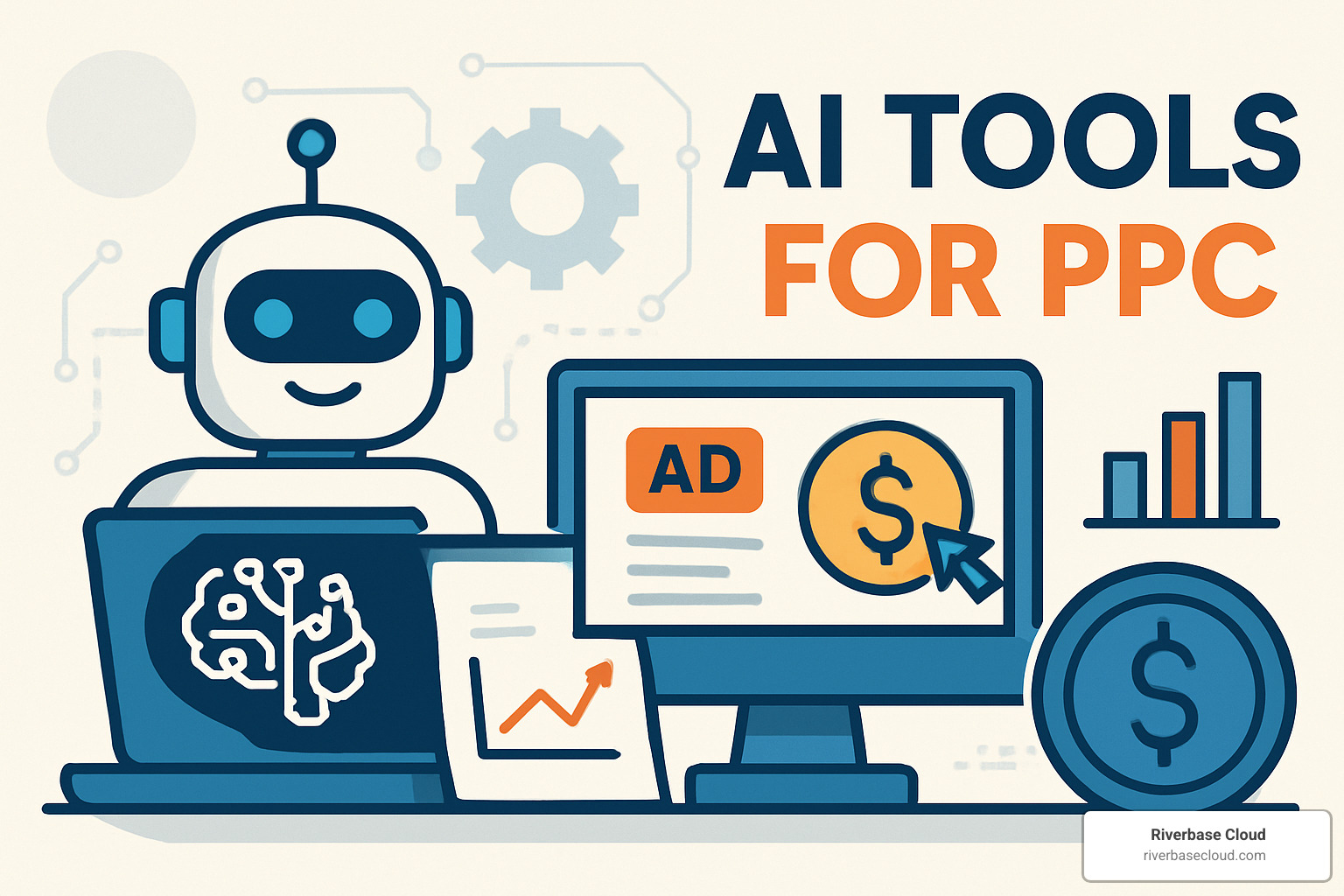
At Riverbase Cloud, this philosophy is at the heart of our Managed-AI ADS service. We don't just throw AI at your campaigns and hope for the best. Instead, we carefully blend cutting-edge tools with hands-on expert management to deliver results that actually matter to your business. We believe that while AI can dramatically accelerate growth, it's the human touch that ultimately drives success.
As these technologies continue to evolve (and they're changing incredibly fast), we'll see even more sophisticated tools emerge. But I'm confident that the fundamental principle will remain the same: use AI for what it does best—processing data, automating routine tasks, and uncovering insights—while relying on human expertise for strategy, creativity, and making sure everything aligns with your brand values.
Looking ahead, we'll need to stay mindful of important considerations like data privacy regulations and the need for continuous testing as these tools evolve. The landscape of digital advertising is always changing, but with the right combination of AI tools and human oversight, your PPC campaigns can stay ahead of the curve.
Ready to see what AI tools for PPC can do for your business? Learn more about our Dashboard Analytics to find how we combine powerful AI capabilities with expert human guidance to drive real, measurable results for businesses just like yours.
